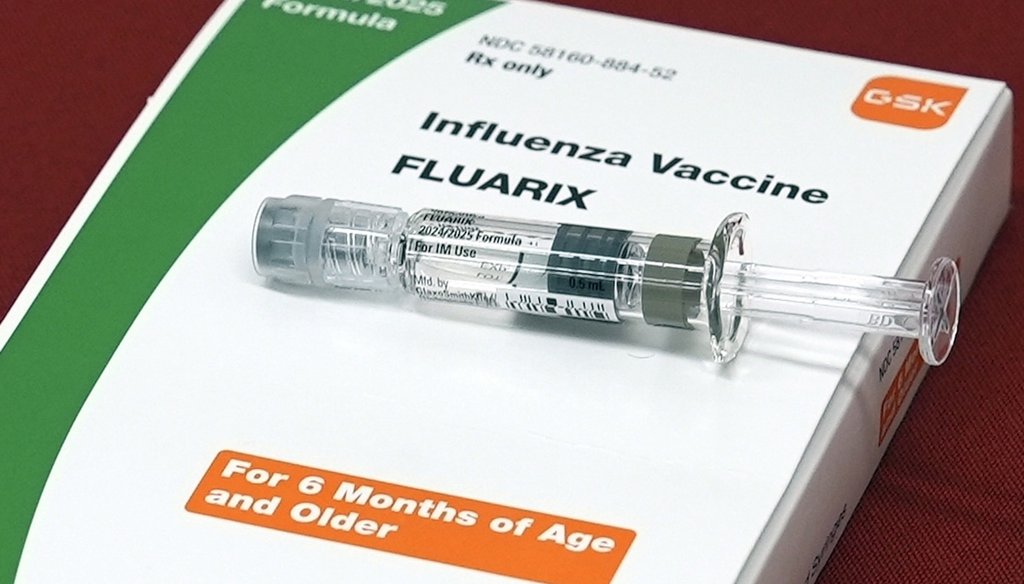Stand up for the facts!
Our only agenda is to publish the truth so you can be an informed participant in democracy.
We need your help.
I would like to contribute

A flu vaccine is displayed at a pharmacy in New York, on Sept. 24, 2024. (AP)
If Your Time is short
-
A Cleveland Clinic spokesperson told PolitiFact the study’s data, not yet peer-reviewed, "came from a relatively healthy population of about 50,000 healthcare workers and did not represent the general population."
-
The spokesperson said the study doesn’t suggest that "vaccination increases the risk of flu."
-
Although the study shows vaccinated participants had an increased risk of getting the flu, it did not measure the vaccine’s primary benefit — how it reduces risk for severe illness, hospitalization and death.
A new Cleveland Clinic study on the flu vaccine grabbed vaccine skeptics’ interest, prompting questions and concerns about the vaccine’s safety.
"Get the flu shot and you are 27% more likely to get the flu!" read an April 7 X post that referenced a preprint study published April 4. "GET THE SHOT GET THE DISEASE!"
The next day, another X post trumpeted news of the study with a call for action: "All flu ‘vaccines’ must be pulled from the market pending large prospective studies of their safety and effectiveness."
The warnings cite a non-peer reviewed article by Cleveland Clinic researchers titled "Effectiveness of the Influenza Vaccine During the 2024-2025 Respiratory Viral Season." It was posted April 4 on the preprint server medRxiv, which discloses in bold typeface at the top that it "reports new medical research that has yet to be evaluated and so should not be used to guide clinical practice."
The study involved 53,402 Cleveland Clinic Health System employees in Ohio and found that its vaccinated participants had a higher incidence of infection in the most recent flu season. But a Cleveland Clinic spokesperson said it’s misleading to use the study to draw broader conclusions about vaccines and susceptibility to infection.
"The data came from a relatively healthy population of about 50,000 healthcare workers and did not represent the general population," Cleveland Clinic spokesperson Andrea Pacetti said.
Sign up for PolitiFact texts
The flu vaccine helps prevent flu cases from getting more severe and requiring hospitalization. Every year, the U.S. Food and Drug Administration’s Vaccines and Related Biological Products Advisory Committee decides which viruses to use for the upcoming season’s flu vaccine. Data collected by the FDA, World Health Organization, U.S. Centers for Disease Control and Prevention and other partners on which flu strains are circulating around the world inform that committee’s decision. (The committee’s meeting to discuss influenza vaccine strains for the 2025-26 influenza season was canceled.)
According to the CDC, during seasons when the flu vaccine strains and the circulating flu strains match, the vaccine "has been shown to reduce the risk of having to go to the doctor with flu by 40% to 60%."
Robert H. Hopkins Jr., the National Foundation for Infectious Diseases’ medical director, said the Cleveland Clinic study does not evaluate the primary benefit for getting vaccinated against influenza: reducing one’s risk for severe illness, hospitalization and death.
"People should be aware that the effectiveness of flu vaccines vary from year to year, but even when flu vaccination does not prevent infection completely, it can make the illness milder and prevent serious complications, including hospitalization and death," Hopkins said.
Hopkins said he "completely" disagrees with the social media post calling for the flu vaccines’ removal from the market. "That action would result in more disease and death from flu," he said.
Nabin Shrestha, a physician and coauthor of the study, said that although the results found an increased risk of influenza among vaccinated participants, the authors understood that the increased risk "could have been from an unrecognized factor," and therefore did not conclude that the vaccine increases infection risk.
Shrestha also said that the study did not suggest that the influenza vaccine should be pulled from the markets because it makes people more likely to get the flu. "Overall, the flu vaccine is an important public health tool," he said.
Profile of the study’s participants
Cleveland Clinic requires workers to get the annual flu vaccine or seek a medical or religion-based exemption, so this study involved a high number of vaccinated people.
Of the participants, 43,857 were vaccinated during the study period, with 98.7% receiving the inactivated trivalent influenza vaccine. By the study’s end, 1,079 participants had gotten the flu — roughly 2% of the entire study population.
Pacetti, the clinic spokesperson, said it was notable that only 2% of the participants contracted influenza during the study period. "The population did not include children and contained very few elderly or immunocompromised individuals," she said.
The study’s results say the cumulative incidence of influenza — or the number of new cases divided by the total number of people in the studyat risk (vaccinated and not vaccinated) — increased faster among the vaccinated participants than the unvaccinated ones.
The authors found that the influenza vaccine had a negative effectiveness, "suggesting that the vaccine has not been effective in preventing influenza" for that season.
What do these findings mean?
Flu vaccine effectiveness can vary per season and per person (factoring in characteristics such as age and health), the CDC said. Their effectiveness also depends on their similarity to the influenza viruses circulating in the community, the agency said.
Data from the agency showed that seasonal flu vaccine effectiveness — or how well the vaccine prevents severe illness and hospitalization — changes per season, with a 42% effectiveness during the 2023-24 season. Researchers found it reduced the risk for flu-related outpatient visits and hospitalizations among children, adolescents and adults.
Hopkins said the study did not discuss if the workplace had masking policies or other restrictions for unvaccinated employees, which "could have an important impact on the incidence of influenza" especially for those working in clinical settings. Around 10,900 participants had a clinical nursing job, the study said.
Pacetti and Jeffrey Morris, biostatistics director at the University of Pennsylvania Perelman School of Medicine, also said the vaccines primarily reduce the risk of death or severe disease, which the study does not address.
The article says the vaccine’s effectiveness in any given year "depends on how similar the strains contained in the vaccine are to the strains causing infection that year."
The study’s authors also said that because nearly all of its participants used the trivalent inactivated influenza vaccine, it’s possible that other influenza vaccines may have been more effective.
Our Sources
Email exchange, Andrea Pacetti, spokesperson for Cleveland Clinic, April 9, 2025
Email exchange, Jeffrey Morris, Biostatistics director at University of Pennsylvania Perelman School of Medicine, April 9, 2025
Email exchange, Robert H. Hopkins Jr., medical director of the National Foundation for Infectious Diseases, April 10, 2025
Emailed statement from Nabin Shrestha, staff physician at the Cleveland Clinic’s Department of Infectious Diseases, April 10, 2025
X post, April 8, 2025
X post, April 7, 2025
Nabin K. Shrestha, Patrick C. Burke, Amy S. Nowacki, Steven M. Gordon, Effectiveness of the Influenza Vaccine During the 2024-2025 Respiratory Viral Season, April 4, 2025
National Library of Medicine, What is a Preprint?, accessed April 11, 2025
CDC, Seasonal Flu Vaccine Basics, accessed April 10, 2025
CDC, Selecting Viruses for the Seasonal Influenza Vaccine, accessed April 11, 2025
FDA, FDA’s Critical Role in Ensuring Safe and Effective Flu Vaccines, accessed April 11, 2025
FDA, FDA Plans for Selecting Influenza Virus Strains for Vaccine Composition for the 2025-2026 U.S. Influenza Season, Feb. 28, 2025
CDC, Benefits of the Flu Vaccine, accessed April 11, 2025
CDC, Trivalent Influenza Vaccines, accessed April 11, 2025
ScienceDirect, Cumulative Incidence, accessed April 11, 2025
CDC, Factors Influencing Flu Vaccine Effectiveness, accessed April 11, 2025
CDC, CDC Seasonal Flu Vaccine Effectiveness Studies, accessed April 10, 2025
CDC, About the Data: Measuring Vaccine Effectiveness, accessed April 11, 2025
Advisory Committee on Immunization Practices, Interim Estimates of 2023–24 Seasonal Influenza Vaccine Effectiveness, Feb. 28, 2024

























